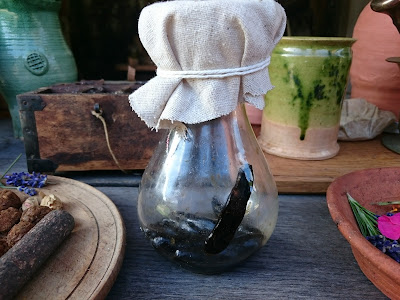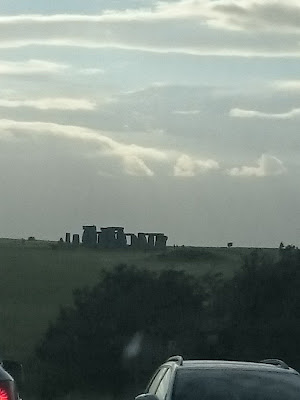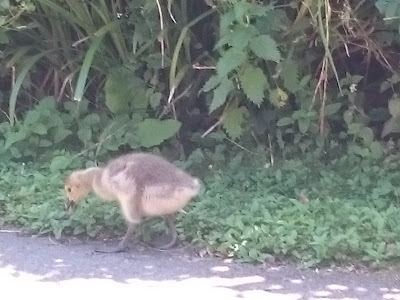Cathartic. Facing some demons. Well, actually cows - or rather, bullocks. No. I'm not being rude I'm talking about young male cattle. To paraphrase Indiana Jones: 'Cows, why did it have to be cows?'.
Last time I was here there weren't any cows. Or bullocks. Just wheat.
Oh and in case I forgot to mention it, the weather was rotten - raining very heavily and persistently.
In my misery at seeing my way forward thwarted by bullocks the fact I was being soaked faded into the background. All I could focus on was that my intended goal was to be denied me due to my fear of bullocks.
I started down the path. Then I noticed that the animals were grazing towards the footpath leading through their pasture. I froze in an agony of indecision, then turned tail and fled.
When I was back in the relative safety of the layby I stood and looked mournfully up over the hill at my unattainable goal.
Then I cried. Actually, crying is an understatement of what I did. I howled - in frustration at my inability to overcome my fear; in deep sadness at failing my children who were to join me in the journey and in fear for being treated like an idiot or silly person.
I felt a hand on my right shoulder and a little voice said, 'It's ok Mummy'. Then an arm wrapped around my left side and my husband joined in the hug. December (who was standing in front of me) looked me straight in the eye and said, 'Its ok to be scared of things, Mummy. I was scared of abseiling but still managed to do it.' I howled some more, but a bit quieter. My family still loved me and were being really supportive and caring.
Eventually I calmed down and felt as though a great burden had lifted from me.
Peeling off our sodden coats we got back into the car and, feeling fed up, I drove away looking for somewhere to turn around so that we could head into Avebury.
After about a mile I saw a turning on the right which I took and I found myself driving on. About 1/4 mile down the lane we saw a public footpath sign so I parked the car and we all piled out and thought we'd see where it went. To my delight we soon realised that this path ran at 90° to the path through the bullock field (with a sturdy fence between us!) and 15 minutes later we were sheltering under an oak tree with ribbons tied to its branches, hoping that the rain would ease off before we started up the hill.
It didn't.
So, having photographed the swifts darting around the raindrops one more time, we ducked our heads and set out once more into the downpour.
By the time we reached the longbarrow we were drenched from ankle to waist. As we paused by the stones blocking the entrance we became aware of chanting emanating from within. At the entrance we found an abandoned umbrella and, cautiously, entered. Our eyes gradually adjusted to the dim light as we moved forward into the barrow and the singing was joined by drumming, which grew to a crescendo as we reached the end of the passage. We were relieved to see that this was all being produced by two very human men, who told us they were singing Hindu chants to Shiva.
As we stepped out of the shadows into the rain, the ethereal notes of a penny whistle echoed out from behind us. Beautiful ❤
Hoping to Break Into an Even Stride Anytime
Friday, 25 August 2017
Monday, 7 August 2017
Travelling in the School Holidays
1. It doesn't matter what time of day you embark upon your voyage, the roads will be busy. Even the ones that are normally quiet. Heck, they're probably the ones that will be worst.
With this in mind, try and choose a route where you will have an opportunity to view ancient monuments or beautiful views. The A303 in Wiltshire is a good example: you can save a lot of money by viewing the majestic Stonehenge from your car, even taking photographs if the traffic is really snarled up.
2. Arrive as early as possible at your overnight stop, to enable you to request a room closer to reception and not a mile away from all the facilities.
The plus side to being at the far reaches of the hotel is that you're less likely to be disturbed by passersby, though you might have to rescue tourists from dark corners who have become confused and lost their map/family/marbles.
3. Breakfast. Specifically buffet breakfast. Generally speaking, these are a great idea especially in the establishments where your children can eat for free. However, during the school summer holidays, it will appear as though a plague of locusts has descended and you will need to have nerves of steel and reflexes of a trained ninja to lay claim to the last slice of bacon/blueberry muffin.
If you don't think that you'll be able to get down to breakfast before 7.30am, consider hitting the road and stopping for breakfast about 9am elsewhere. It may cost more, however you'll be miles ahead of the hordes and you will (should) eat in peace.
Saturday, 8 July 2017
Wednesday, 5 July 2017
Herbs in History
Among other things on her table, there was a long list of causes of death during the early 1800's which was interesting, though many of them sounded horrifying. Cancer and Canker were listed separately which surprised me, as I had thought Canker to be an old name for Cancer - I was told that Cankers are actually sores on the skin - so to die from them must have been very painful. Also listed were Lunacy, Gout and Childbirth - even though Gout can be excruciating I didn't know that it could kill you.
We talked about what treatments and medicines were available at that time, many of which would still have involved herbal preparations.
Afterwards, we went across the market square to look at an Apothecary's shop set up from about the late 16th century.
 |
| Apothecary Shop |
 |
| This chart was used to diagnose illness using the patients urine |
 |
| Leeches - used in blood-letting |
 |
| Chest used for storing medicinal ingredients |
 |
| Ingredients ready to be processed |
 |
| Brass pestle and mortar used to grind ingredients together |
 |
| Salve ready for use (and for testing!) |
Saturday, 1 July 2017
30 Days Wild in June - Round Up
Life has been very busy and I haven't had time to blog about our activities for the last several days, so here is a round up of my favourite s from this week:
10.30pm 22nd June
Jumping waves, Littlehampton East Beach, 23rd June
Birthday cakes on the beach, 23rd June
Purple podded peas, Weald and Downland Living Museum
Leek flower - we all thought it looked like it was wearing a nightcap!
Leek flowers opening
Running through a meadow full of beautiful wildflowers
Tuesday, 20 June 2017
30 Days Wild in June - Bugs and Birds
Today dawned with the best kind of summer holiday weather which, as a child, would have had me and my family grabbing buckets, spades and beach towels and heading down to our favourite small, sandy cove on the Lizard in Cornwall.
As it was Father's Day, after the girls had given my husband his cards and gifts, we went to the nearby WWT at Arundel thinking it might be cooler near all those lakes and ponds.
It was just after 11am and already very hot when we arrived and, as we crossed the footbridge to the entrance, a kingfisher darted out over the pond and hovered for a few seconds before darting back to the shade of the trees - what a greeting!
The girls wanted to feed the birds first:
Then we went along to the pond dipping area, it was so hot that we only stayed there for about half an hour. Our small haul consisted Alderfly larva, bloodworms and tiny shrimps:
We retreated to a nearby hide for shade and spotted a family of Canada geese in the shade of the trees:
After a couple of hours we decided that it was to go home as it was so hot. On our way we saw some Magpie Geese and their nest in a fenced-off area, which a nearby staff member told us was because the male can be very aggressive while the females are laying their eggs. She explained that they usually lay about 14 eggs before they start incubating them - they had 3 so far.
Just as we reached our car, I saw something small dart across the car park and stop beneath our car. It was a tiny duckling! Gabby went to tell a warden, who came along and had to climb under the car to catch it!
Friday, 16 June 2017
30 Days Wild in June - Baby Birds
On Wednesday we saw some very cute fluffy goslings. Their parents were not at ALL cute and fluffy and were quite insistent that folk not get too close to their offspring! However, I managed to get a few photos and we all managed to not get pecked :)
Today, while out on a walk with my husband and June, December discovered a baby bird lying on the verge.
My husband tried to phone the RSPCA for advice but only got automated messages. So then he telephoned the non-emergency local police number (101) who advised that they put the bird into a well-ventilated box and take it to the nearest vet. As they were in the middle of a walk they didn't have easy access to a box, until December thought to look in someone's recycling bin where she found a small box suitable for the job. Then they walked a mile into the nearest village where there is a veterinary practice and the receptionist kindly took the little creature into their care, saying that they would look after it.
I found out all about this when they got home (an hour later than expected!). My husband told me that whilst the bird was moving around quite a bit when they first found it, by the time they reached the vet's it had become still and he wasn't sure how good it's chances of survival were. Fingers crossed it makes it.
Subscribe to:
Comments (Atom)





























